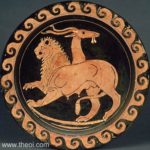 A chimera (pictured here) is a mythical creature composed of parts from different animals. Does it represent our ancient ancestors’ first forays into fantasies about genetic tinkering with animals for real? If so, then the subject of this week’s podcast shouldn’t have made me as hot and bothered as it did. Still, no matter how I look at the current trend in genetic manipulation, I see the Law of Unintended Consequences lurking in the shadows. Here’s a link to the article that got me ruminating about this subject…
A chimera (pictured here) is a mythical creature composed of parts from different animals. Does it represent our ancient ancestors’ first forays into fantasies about genetic tinkering with animals for real? If so, then the subject of this week’s podcast shouldn’t have made me as hot and bothered as it did. Still, no matter how I look at the current trend in genetic manipulation, I see the Law of Unintended Consequences lurking in the shadows. Here’s a link to the article that got me ruminating about this subject…
Podcast: Play in new window | Download
Subscribe: Apple Podcasts | RSS | More
I, too wonder what the repurcussions for some of this would be…bringing back the wooly mammoth, for instance; to serve what pupose? And oh dear, just how would we keep it fed??? All kidding aside, I like the idea of preserving some animals, but to what end? And where would they be kept? Are we providing more for zoos, or more to be poached? It really is quite the dilemna. I respect you and your intelligence, as you come highly recommended by my friend, Ann Firestone. I did like the idea of the cutting back on malaria-carrying mosquitoes and the overload of rats and mice in some places. I really like the idea helping our bat population (which inturn, may help some of the mosquito population), as well as the help with the black-footed ferret (“The group has submitted two proposals to the United States Fish and Wildlife Service to essentially bring back to life ferrets with rare genes.’). That being said…many states have an ugly reality that is trapping. With ethical hunting, there are choices with respect on what can be hhunted, when and what size; trapping doesn’t have that luxury. F&W supports trapping- and there are no penalties or records indicating if and when the “wrong” animal is caught. This genetic fussing has its good and bad points; we must be very careful how we use that knowledge.
I agree. We need a broader more ecological approach to these problems. Unfortunately that’s difficult to come by in a world in which eliminate-the-variables studies and specialists reign. And a general population with an incredibly short attention span and little interest in gaining such a view. As Henry Beston wrote just shy of a century ago, we prefer to see “a feather magnified” instead of the whole bird who belongs to a population and species living in a ecology with countless others of different species of all kinds. This kind of thinking is like driving while texting or talking on the phone: we convince ourselves that we know what’s going on around us, but we don’t.